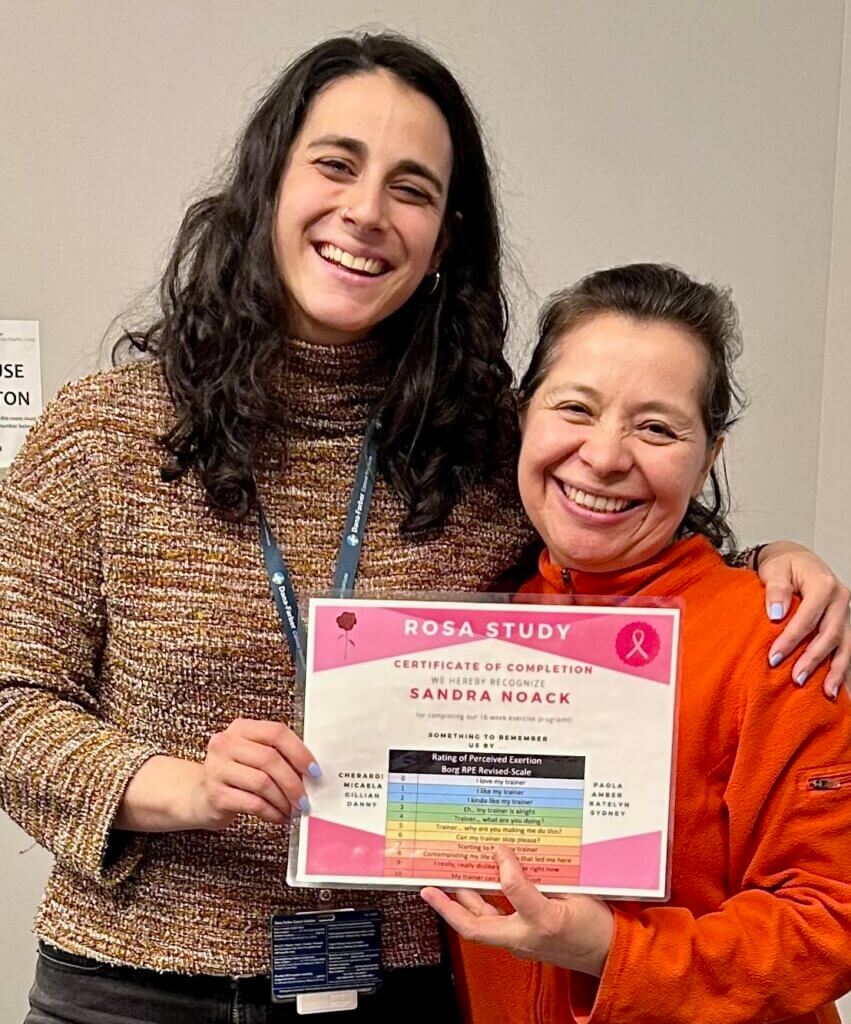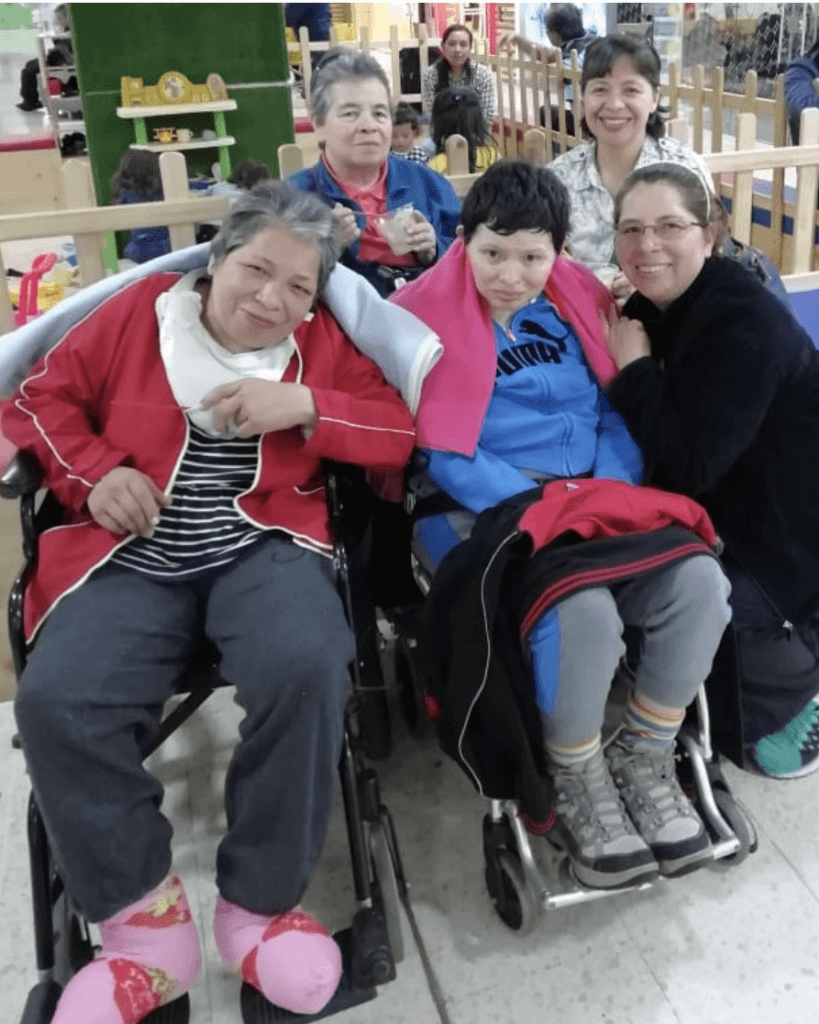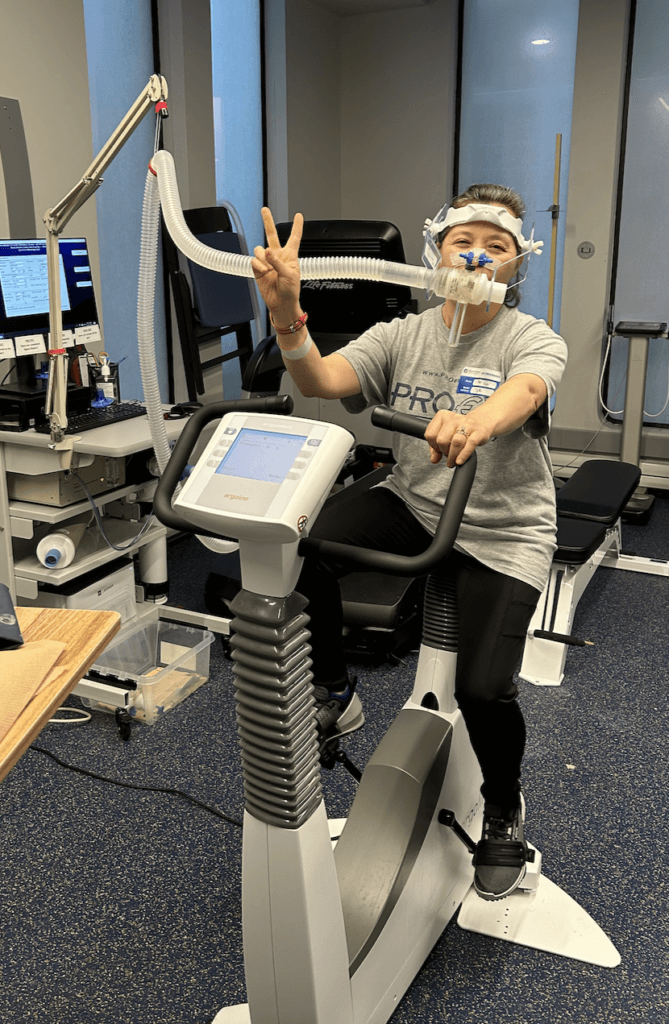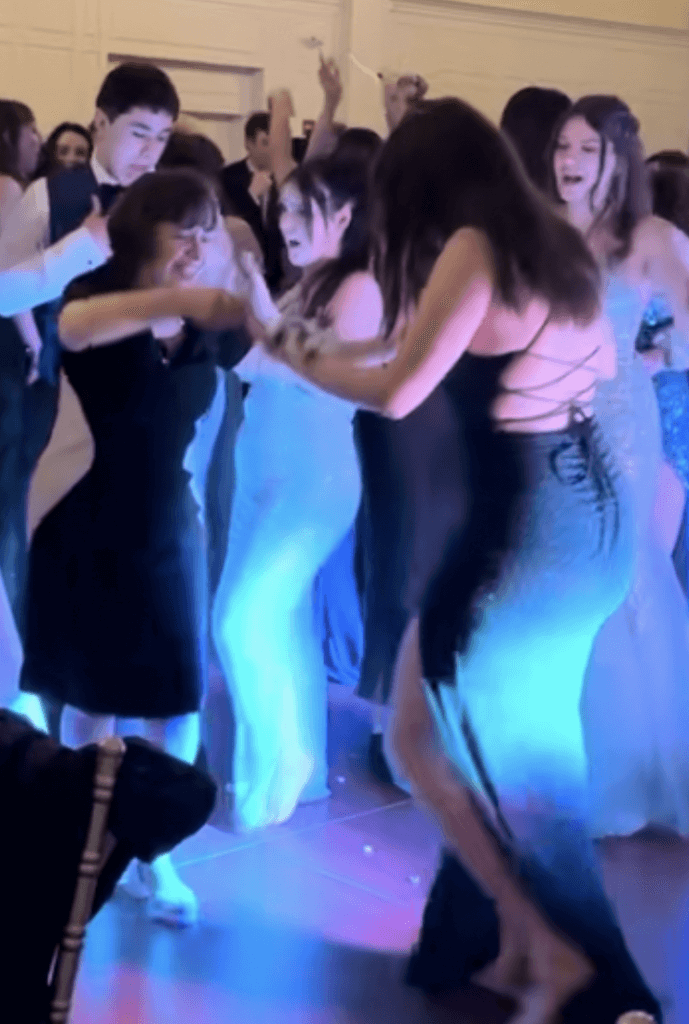When Sandra Noack returned home from a visit to Bogota, Colombia, to visit her family, there was a letter waiting for her. It was a leaflet sent via the Massachusetts Department of Public Health describing a clinical trial at Dana-Farber Cancer Institute for Latina and Hispanic breast cancer survivors.
The trial didn’t involve any medicine. The intervention, she read, was exercise.
“I thought, this is amazing,” says Noack, a 58-year-old Spanish teacher living in Wakefield, Mass.
Noack had been treated for breast cancer in 2018 at Dana-Farber. She called about the trial immediately.

The ROSA trial is part of a series of clinical trials run by Christina Dieli-Conwright, PhD, MPH, an investigator at Dana-Farber, to learn more about the role of exercise as medicine for cancer. She has several trials specifically for groups that have historically been marginalized and underrepresented in clinical trials. Due to systemic inequities, populations such as Latina and Hispanic women more frequently have reduced fitness levels, higher rates of obesity and heart disease, and higher risks of poor outcomes related to cancer.
Noack wasn’t thinking about all that, though. What she saw in this leaflet was an opportunity to improve her health at a time when her family needed her, but she wasn’t feeling her strongest.
“The philosophy was in there, that exercise helps with everything. Physically. Mentally. Feeling well,” she says. “I wanted that.”
Pass the tissues
Noack was born in Bogota, Colombia and moved to the Boston area in 2001. She recalls her new doctors telling her she needed to get a mammogram. She had never had one.
The process was intimidating. “I was always in tears,” she says, and eventually stopped going.
After a few years, a new doctor urged her to start getting mammograms again. She went. The following day she got the call. She needed an ultrasound. Then a biopsy. And then came the news. Noack had a form of breast cancer called invasive ductal carcinoma.
“It was a shock,” she says. “At that time, if you asked me about cancer, it was like asking me about Jupiter. I don’t know anything.”
But she did know to lean on friends, including several friends from her church who she learned had also had breast cancer. On the advice of friends, she opted to go to Dana-Farber for a second opinion and treatment.
“We chose Dana-Farber because they are the experts in cancer,” she says.

Confessions
On January 10, 2018, the day of Noack’s surgery, two of her sisters were also going through procedures in Bogota. Noack did not want to burden them with her breast cancer diagnosis or surgery, so she didn’t tell them about it.
She fessed up that summer, during a visit to Colombia. “Of course, they were mad at me,” says Noack.
Things changed quickly for Noack’s family in the coming years. One sister passed away due to complications related to epilepsy in 2020. Her mother passed away in 2022. Her remaining sisters, one of whom also has epilepsy, began to rely on her for help.
Helping, however, was a challenge. She’d had the lumpectomy in January of 2018, but her recovery was difficult. For a long time after surgery, Noack felt such discomfort that she stopped moving and using her left arm. Her husband sometimes had to comb her hair for her.
“I wanted that to get better,” says Noack, who was also searching for ways to reduce the risk of her cancer returning.
With these worries in mind, the ROSA trial looked like a great opportunity. She spoke to Danny Nguyen, a clinical research coordinator at Dana-Farber, and learned that she needed to meet more criteria than just being a Latinx breast cancer survivor. The trial is specifically for people who have signs of metabolic dysregulation, which can lead to obesity or a body composition that can increase the risk of cancer returning.
She went in for a few tests and then Nguyen called with the news. “He said I qualified,” says Noack. “I was super happy.”

Feel the burn
The trial provides patients who enroll with fitness equipment, including a stationary bike, dumbbells, resistance bands, and a smartwatch. The first phase of the 8-month-long program involves 16 weeks of virtual one-on-one supervised fitness sessions three times per week.
The sessions are led by certified exercise trainers in the Dieli-Conwright Lab. These trainers receive specific training to work with people who have had cancer and who have not been exercising. They also speak fluent Spanish and English.
“I was so surprised. I didn’t expect anybody to speak Spanish,” says Noack. “It made me feel at home. It makes you feel special, like really good.”
Noack devoured the program, which began in 2023. She loved the bike, even though she’d been counseled years ago not to bike due to knee pain she’d experienced. She struggled the most with shoulder exercises. Her left arm was hard to lift over her head, a challenge many patients face after breast cancer treatment, says Nguyen.
But she persisted, and the trainers encouraged her and helped her use proper form by observing her via Zoom during their sessions. Having been inactive for most of her life, Noack needed the coaching. She was struggling with sit-ups, for instance, and the trainers helped her adjust the movement to be safer and more effective. “I thought it would have to be painful, but it didn’t,” she says. “They were really caring for us.”
During the training, Noack had to travel to Colombia to help her sisters. Instead of skipping her workouts, she joined a gym near her sister’s home. She shared the leaflet with the coaches there and showed them her training plan and the chart she needed to fill out. They jumped right in to help supervise her.
“I didn’t want to lose the progress,” she says. “You start something, you have to keep going.”
At the end of the 16 weeks, Noack transitioned into an unsupervised phase and did her best to continue exercising regularly without the help of the trainer. She does, though her sessions are sometimes shorter and less frequent than when she was supervised.
As part of the trial, Nguyen measured Noack’s progress. She was stronger. She had more stamina. She had more mobility in her arm. Her cognitive tests had improved.
“Sandra is one of our rockstars,” says Nguyen.

Fiesta time
Noack completed the ROSA trial and attended her last appointment in February of 2024. Through her participation, she learned a lot about how to safely exercise, how to carve out time in her schedule to do it, and how to enjoy the results.
When Noack, who teaches high school Spanish, taught a segment on yoga, she found herself doing the moves right along with her students. On another visit to Colombia, she went for a walk on local hilly trails. Her friends and family couldn’t keep up with her.
She also recently attended a Fiesta held by her church as part of a marriage retreat. She danced the evening away. The next morning, her friends were complaining of sore backs and tired legs. But not Noack.
“That was nothing,” she says. “I was ready for more.”
